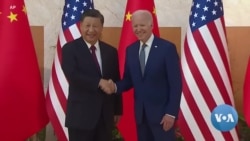U.S. President Joe Biden and Chinese President Xi Jinping will meet at the historic Filoli estate south of San Francisco on Wednesday, holding about four hours of in-depth talks on a range of bilateral and global issues, according to people familiar with the planning.
The talks are taking place on the margins of a summit of Asia-Pacific Economic Cooperation, or APEC, nations, the city is hosting.
Filoli Estate and choreography
The location of the talks is a VOA exclusive. Filoli boasts nearly 265 hectares of natural lands that feature a Georgian revival-style mansion, English Renaissance gardens, a 2.8-hectare orchard and a 1.6-kilometer trail.
Xi and Biden both arrive in the San Francisco area on Tuesday ahead of their meetings, which are expected to include a working lunch, a stroll on the estate, and a smaller meeting with national security advisor Jake Sullivan and Secretary of State Antony Blinken present. Other senior officials will hold separate sessions on particular issues.
Late Wednesday, President Xi is expected to attend two receptions with select U.S. business and cultural leaders. A U.S. Cabinet official is expected to introduce Xi before the Chinese leader delivers an address “to the American and Chinese people,” according to an invited participant, speaking on condition of anonymity.
“We're setting some time aside for the two leaders to sit down and have in-depth conversations on the full range of issues that the U.S. and China face across the globe and bilaterally,” a senior U.S. official told reporters recently when asked about the choreography of the Biden-Xi meeting.
Chinese officials had requested a venue separate from that of this week’s APEC summit, seeking discussions that extend beyond the duration of those held last year in Bali, Indonesia. Biden and Xi met for three hours last November on the margins of the summit of the 20 biggest economies, known as the G20.
Video report by Patsy Widakuswara
Artificial Intelligence
Another senior official mentioned that some of the outcomes the U.S. is seeking are “substantial” and “just different from” those in the past.
On Monday, the United States announced its participation, joining 45 governments, in the launching the implementation of the Political Declaration on Responsible Military Use of Artificial Intelligence and Autonomy. This initiative contains 10 concrete measures to guide the responsible military use of the full range of AI applications.
Biden and Xi are reportedly expected to agree to limit the use of AI in nuclear weapons, according to the South China Morning Post.
“When it comes to artificial intelligence, that we believe that artificial intelligence should not be in the loop or making the decisions about how and when a nuclear weapon is used,” U.S. Secretary of State Antony Blinken told VOA in a press conference last week after a G7 meeting in Tokyo. The G7 is composed of the seven leading industrialized nations.
Blinken declined to say how this issue would be discussed when the two leaders meet later this week.
A State Department official has told VOA the United States will maintain human control for all actions critical to informing and executing decisions concerning nuclear weapons employment. But “the challenge now is to convince” China and other nations to join the U.S. “in committing to norms of responsible AI behavior.”
US, China, and Taiwan
The road to Biden’s meeting with Xi is paved with differences between the two countries over Taiwan and a host of issues, including trade tensions, forced technology transfer, and human rights.
While the U.S. stated that its goal is to responsibly manage competition with China, the government in Beijing has refuted this, saying the relationship between the world’s two largest economies “should not be defined by competition.”
This week, Chinese Ministry of Foreign Affairs spokesperson Mao Ning said during a briefing in Beijing that “major-country competition runs counter” to the current trend and “provides no answer to the problems in the U.S. or the challenges in the world.”
Without providing a name, Mao accused “external forces” and Taiwan’s ruling Democratic Progressive Party of supporting a “separatist agenda” that is changing the status quo. She said Taiwan is “China’s internal affair.”
The Chinese Communist Party has never ruled Taiwan but claims sovereignty over the self-ruled democracy. The U.S. does not take an official position on Taiwan’s sovereignty, nor does it support Taiwan independence.
In the weeks leading up to Taiwan’s presidential election scheduled for January 13, 2024, the U.S. has cautioned China against any interference, stating that such a move would raise extremely strong concerns. China considers Taiwan a wayward province and has never ruled out using force to take full control.
The United States has voiced deep concerns over “a ramping up of military activities around Taiwan” by the Chinese military ahead of the election that the U.S. terms “unprecedented,” “dangerous,” and “provocative.”
“We also believe that those actions undermine peace and stability across the Taiwan Strait and the Indo-Pacific,” said a senior U.S. official.
“Chinese interference in Taiwan's democratic election may not unfold as the Chinese government desires, and often, it will create very negative impressions among the Taiwanese people,” said Joseph Wu, Taiwan’s minister of foreign affairs.
He told VOA that high-level talks between Biden and Xi, as described by senior U.S. officials, aim to stabilize the fraught relationship between the two countries and enhance regional security in the Indo-Pacific, which would benefit Taiwan.
“We are not concerned,” said Wu, when asked if Taiwan worries that Washington and Beijing would make deals that hurt its interests and defense needs.










